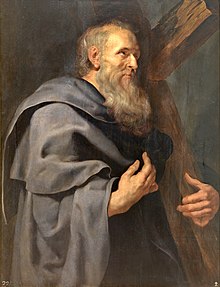Saint Philip the Apostle
| Philip the Apostle | |
|---|---|

St. Philip, by Peter Paul Rubens, from his Twelve Apostles series (c. 1611), at the Museo del Prado, Madrid
|
|
| Apostle and Martyr | |
| Born | Bethsaida, Galilee, Roman Empire |
| Died | 80 A.D Hierapolis, Anatolia, Roman Empire |
| Venerated in | Christianity Islam (named in exegesis) |
| Canonized | Pre-congregation |
| Major shrine | relics in Basilica Santi Apostoli, Rome |
| Feast | 3 May (Roman Catholic Church), 14 November (Eastern Orthodox Church), 1 May (Anglican Communion, Lutheran Church and pre-1955 General Roman Calendar), 11 May (General Roman Calendar, 1955–69) |
| Attributes | Elderly, bearded saint and open-to-God man, holding a basket of loaves and a Tau cross |
| Patronage | Cape Verde; Hatters; Pastry chefs; San Felipe Pueblo; Uruguay |
Philip the Apostle (Greek: Φίλιππος, Philippos) was one of the Twelve Apostles of Jesus. Later Christian traditions describe Philip as the apostle who preached in Greece, Syria, and Phrygia.
In the Roman Catholic Church, the feast day of Philip, along with that of James the Less, was traditionally observed on 1 May, the anniversary of the dedication of the church dedicated to them in Rome (now called the Church of the Twelve Apostles). The Eastern Orthodox Church celebrates Philip's feast day on 14 November. One of the Gnostic codices discovered in the Nag Hammadi library in 1945 bears Philip's name in its title, on the bottom line.
The Synoptic Gospels list Philip as one of the apostles. The Gospel of John recounts Philip's calling as a disciple of Jesus. Philip is described as a disciple from the city of Bethsaida, and the evangelist connects him with Andrew and Peter, who were from the same town. He also was among those surrounding John the Baptist when the latter first pointed out Jesus as the Lamb of God. It was Philip who first introduced Nathanael (sometimes identified with Bartholomew) to Jesus. According to Butler, Philip was among those attending the wedding at Cana.
Of the four Gospels, Philip figures most prominently in the Gospel of John. Philip is asked by Jesus how to feed 5,000 people. Later he appears as a link to the Greek community. Philip bore a Greek name, may have spoken Greek, and may have been known to the Greek pilgrims in Jerusalem. He advises Andrew that certain Greeks wish to meet Jesus, and together they inform Jesus of this (John 12:21). During the Last Supper, when Philip asked Jesus to show them the Father, he provides Jesus the opportunity to teach his disciples about the unity of the Father and the Son.
...
Wikipedia
